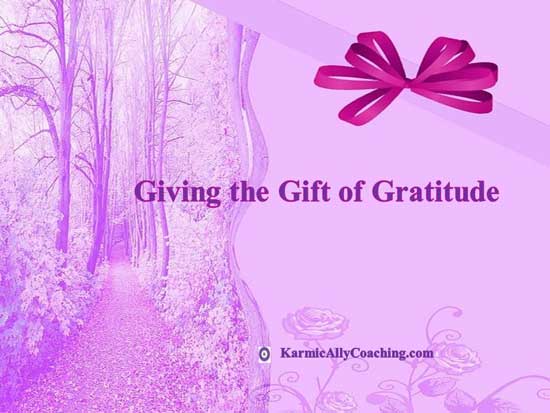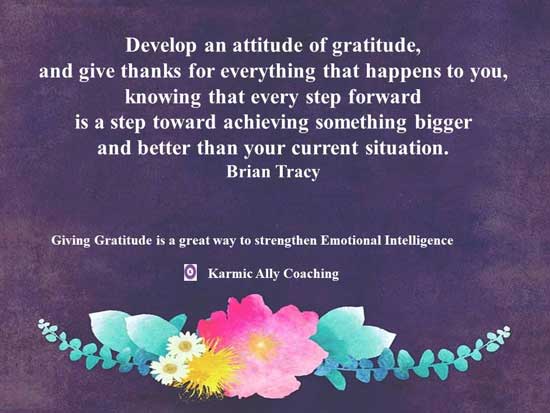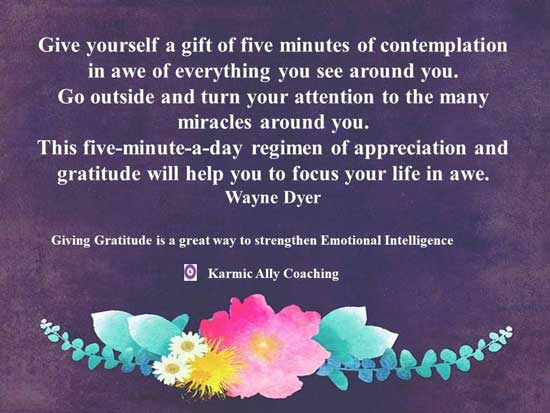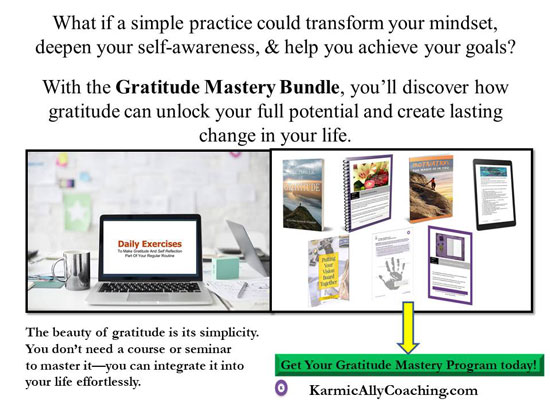Prefer to read? Here’s the transcript with resources.
Even if we don’t realize it, right from childhood, we’ve all been taught the value and practice of gratitude.
It’s the thank you we said when we got a gift and it’s the grace we said before our meals. Sometimes if we were being difficult or throwing tantrums, our parents might have even yelled out the command to be grateful!
Hi. I’m Vatsala Shukla from Karmic Ally Coaching and today, I’m going to delve deeper into the role of gratitude in strengthening our emotional intelligence with some tips to cultivate gratitude.
In recent years, giving gratitude has been seen as a practice associated with visualizations, law of attraction and as part of manifestation rituals.
It’s actually a lot more than that. We think of gratitude as a simple emotion but it’s a gift that we can give others. It can also strengthen our skill of emotional intelligence.
Allow me to elaborate on both points.
Giving the Gift of Gratitude
Now, when was the last time you were on the receiving end of someone’s gratitude? Not just a casual, “Thanks!” but an honest, heartfelt, deeply appreciative, “Thank you for ______________.”
It felt good, didn’t it?
If it was someone who really knows how to say thank you, you were probably acknowledged for some sacrifice you’d made, and the way your gift or action made them feel…and your heart warmed, and your face smiled.

Gratitude is such a simple gift to give, so powerful, and yet so easy to forget.
In a world where everything has to be done 5 minutes ago, and rapid forward movement is the only way to not get left behind gratitude and appreciation all too often fall by the wayside.
Yet, as you know, saying thank you is one of the easiest ways to bless others and lift them up. Gratitude makes the receiver feel seen, recognized and appreciated…and it can all be done well in less than 30 seconds.
30 seconds. That’s only 0.05% of your total waking hours.
It takes longer than that to brush your teeth!
When we feel seen and appreciated, we perform better at work. We get less angry. We share our gifts more easily. We love stronger. When you’re seen and appreciated for who you are and what you do, it makes you strive to be a better human.
If you were to spend 30 seconds sharing your gratitude every day, you would be investing .05% of your waking life to make someone else’s day at least 30% better.
Now talk about return on investment, right?
Plus, when you take the time to offer others a sincere thank you, you also become a model for others. You become an inspiration, quietly encouraging others to express their gratitude.
In short, by simply giving the gift of your appreciation, you instantly become a respected leader at home, at work, and everywhere else…all while making the world a better place.
And that feels good, doesn’t it?
Now about Gratitude as a way to develop Emotional Intelligence
During the pandemic, I discovered that my morning gratitude ritual provided me with resilience to face the uncertainty of the days ahead.
Being grateful for the gift of a new day, the safety and health of my loved ones or even gratitude that I had not run out of pet food during lockdown made it easier to cope with the stress of a situation for which my mind did not have any prior experience to refer back to. It was uncharted territory for all of us.
Practicing gratitude didn’t mean I was denying the reports of record infections or becoming immune to the negative reports of deaths among our circle of friends, loss of jobs or worrying when I could get a vaccine.
It simply meant shifting my focus from negative and painful experiences and finding hope. It provided my brain with support to process the difficult experience and was a protective response to support my well-being during that challenging time.
That’s when I started to wonder if there was more to gratitude than I had previously realized.
Apparently, I wasn’t alone in my thoughts and there has been research on the role of gratitude in building emotional resilience and strengthening emotional intelligence.
Research indicates that there are 2 parts to gratitude. Firstly, it is an affirmation of goodness and acknowledging that there are good things in the world. This is what we practice in our gratitude ritual.
In the second part of gratitude, we recognize that the sources of this goodness are outside of ourselves, and we acknowledge that other people give us many gifts to help us achieve the goodness in our lives.
To demonstrate high emotional intelligence, we need to develop our emotional resilience first. Gratitude enables us to strengthen our skills in the domains of self-awareness and self-management as well as social awareness and social management.
Practicing gratitude creates a heightened awareness of your emotions, values, strengths, and a greater understanding of others. Heightening your emotional intelligence through gratitude allows for reflecting on your feelings, emotions and motivators, and perceiving those of others.
Cultivating a grateful mindset also allows us to recognize unhealthy emotions and reframe our thoughts, feelings, and behaviors. This deepens our emotional intelligence capacity. With greater emotional intelligence awareness, you have a choice – a choice in how you interact with and join in the experiences of others.

You don’t need to take a course on learning how to be grateful. You can integrate it into your life until it becomes second nature. I’ve got some recommendations to develop your attitude to gratitude.
And here are the 5 Ways You Can Cultivate Your Gratitude
It’s a fact that most of us lead busy lives these days. It might feel like a waste of time to think about the things in your life that you can be grateful for. But doing this is essential, as you will derive some incredible benefits from being grateful for what you have in your life right now. Try these simple yet powerful actions to cultivate your gratitude every day.
The first one is to stop what you are doing and take a look around you
Make a commitment to pause at different times during the day and ask yourself the question “what can I be truly grateful for in my life?” You can also ask yourself “who are the most important people in my life and why am I grateful to them?”
When you ask yourself these questions your mind or rather your subconscious mind will come up with a number of answers for you. Take these answers and assess why the people or things are so important for you and you express your gratitude for having them in your life. This won’t take you long to do each day and will get you into the habit of looking for things to be grateful for.

Have a good look at the qualities you possess
Being grateful for the qualities you possess is a very powerful way to cultivate your gratitude and increase your self-esteem. Think about what you have achieved recently and the problems that you had to overcome. You can go back into your past for some good examples of this as well.
You can look beyond the things that you have achieved as well.
What other traits do you possess that you are proud of?
Do you provide acts of kindness to others? Do you have good empathy skills? Do you have a lot of love for your partner, your family and your friends? Or your pet?
There are always lots of things that you can come up with about yourself.
Also, what things do you take for granted?
When people are starting out on their attitude of gratitude journey, they will usually think about the bigger things in their life to be grateful for but don’t limit yourself to this. The smaller things in your life are just as important to you.
Just open your eyes and take a look around you. If you are at home, then notice the wonderful things that surround you to make your life easier and more enjoyable. Take a walk outside and notice the beauty of nature as well.
A fifth way is to Have a Morning and Evening ritual
I touched upon this earlier when I spoke about my gratitude ritual during the pandemic.
It is easy to forget about expressing your gratitude in modern life. I highly recommend you create a new routine where you will think about things to be grateful for in the morning when you wake up and before you go to bed at night.
Think about 3 things that you can be grateful for at these times. It does not matter if they are big or small things. In the morning it could be the simple fact that you are grateful for a new day ahead.
Write down the 3 things in the morning and evening in a gratitude journal so that you can reflect on these later on.
Final Words – Show your Gratitude to others
Cultivating the attitude or habit of gratitude isn’t difficult and worth the effort because it also strengthens our emotional intelligence. This skill is important if you are aspiring for a leadership position.
So, take every opportunity that you can to express your gratitude to others. When you do this the recipient will be very appreciative and this will give you a warm glow inside. In turn this will make you feel a lot happier to see the smiles on their faces and hear their words of appreciation. And if you need more help, I’ve got a couple of resources listed here. Have a look and take what works for you.
This is Vatsala Shukla for Karmic Ally Coaching signing off. Bye for now.
Additional Resources for developing Gratitude
Are You Practicing the Power of Appreciation?
Do you dare to cherish Everyone?
How to Develop Emotional Intelligence with Ease
Emotional Intelligence Traits Checklist
Gratitude Mastery Bundle – a simple yet unique Way to raise your vibrations every day.
You will be directed to Karmic Ally Coaching’s Success Solutions portal and the entire transaction will be done over a secure line.
Since Karmic Ally Coaching is offering non-tangible irrevocable goods, we do not issue refunds once the order is accomplished and access is granted to the product. As a customer, you are responsible for understanding this upon purchasing any item from this website.
Please note all digital products are non-refundable once payment is processed. This digital product is yours forever. If you have any questions or concerns, please ask in advance of purchase at vatsala(at)karmicallycoaching(dot)com.




 I adhere to the Certified Coaches Alliance Code of Ethics and Standards. A copy is available on request.
I adhere to the Certified Coaches Alliance Code of Ethics and Standards. A copy is available on request.
 Let's Talk through the Connect Form:
Let's Talk through the Connect Form: